Families cling to hope in Belarus after first release of political prisoners
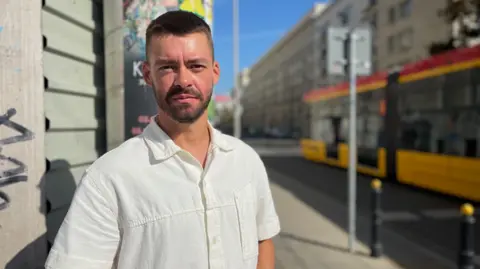 BBC
BBCDmitry Luksha built up muscles breaking rocks in a Belarusian prison camp, put to work alongside men convicted of murder and drug smuggling.
The journalist was imprisoned in 2022 and sentenced to four years for his reports on the mass opposition protests of 2020 and his country’s later complicity in the full-scale invasion of Ukraine.
But he’s just been released early, one of several dozen political prisoners freed this summer in a series of surprise amnesties.
It’s given hope to the relatives of others that further releases might follow.
“One day they called me in, and a man from the prosecutor’s office just asked, ‘Do you want to go home?’,” Dmitry recalls, now in Poland with his wife, Polina.
She’d been convicted as his "accomplice" and the couple were freed at the same time.
Human rights organisation Viasna calculates that 78 political detainees have been given an amnesty so far in recent weeks. Many have serious medical conditions, but not all of them. The criteria for early release are unknown.
Like everyone, Dmitry first had to request an official pardon from Belarus leader Alexander Lukashenko.
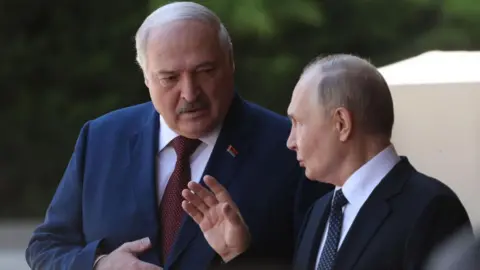 Getty Images
Getty ImagesFour years ago, the authoritarian leader was almost forced from power by enormous street protests which were eventually crushed with police brutality and mass arrests – and with Russian political support.
With another election due next year, perhaps as soon as February, it is possible Lukashenko is hoping for an image boost: state propaganda channels have been presenting the amnesties as a "humane" gesture by a "wise" leader.
Dmitry Luksha isn’t sure of the true motive or why he was chosen: “Maybe those who started the process, the arrests, realise they went too far. I don’t know."
But he says “20-30%” of all inmates in the prisons where he was held were there for political reasons.
They are marked by a yellow tag stitched to their chest so they are easy to spot.
“It’s such a moment of joy to be home. Of euphoria. To hug our families and to breathe freely again,” Dmitry says.
“The main thing is that this process is happening. And for it not to stop.”
'Killing her slowly'
The unexpected releases have given hope to other prisoners’ families, including those of high-profile detainees like Maria Kolesnikova.
“I believe this is a moment when Lukashenko started to send signals to the Western world that he will be ready, in the future, to negotiate on releases,” Maria’s sister Tatsiana Khomich argues.
For her, the need is urgent.
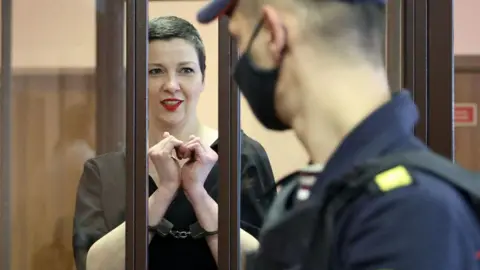 RAMIL NASIBULIN/BELTA/AFP
RAMIL NASIBULIN/BELTA/AFPThe conditions in which Maria is being held are “killing her slowly”, her sister warns. “I think any means [possible] should be used to help her. To save her. Because her situation is critical.”
A classical flautist, Maria Kolesnikova helped lead the peaceful street protests in 2020, becoming hugely popular for her seemingly boundless energy and optimism. She was later sentenced to 11 years for "conspiring to seize power".
In prison she had emergency surgery for a perforated ulcer and is since reported to have lost at least 20kg (three stone), and is now said to weigh only 45kg. She’s being denied extra parcels or cash for the special diet she needs.
“Maria is starving in the colony. I believe she already passed a critical weight loss that endangers her life,” her sister worries.
Tatsiana only gets snippets of information via other prisoners when they’re released, because since March 2023 Maria has been kept in punishment cells.
She is held in isolation, with no calls, letters or visits. For months at a time, she can be denied even a half-hour daily walk around a tiny, covered prison yard.
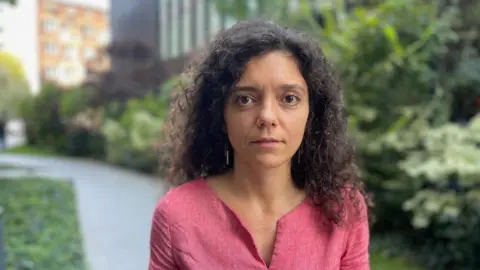
“We saw that the international community didn’t react in time in the case of Alexei Navalny,” says Tatsiana, remembering the Russian opposition activist who died suddenly in prison as talks over a possible deal to free him were under way.
“They were too late and not very decisive.”
In the end, a major prisoner exchange with Russia did take place – including some well-known Russian dissidents – and that gave Tatsiana some hope.
“We saw that everything is possible. We saw that you can negotiate during a war, or a Cold War. You can negotiate with people you name terrorist, or dictator.”
There are others who sense a moment of opportunity with the Belarusian leadership: signals that it is seeking to engage again with the outside world.
“I think the Lukashenko regime is interested in avoiding becoming part of Russia. That’s why they want some communication with the West. That’s why they're releasing prisoners,” argues Ryhor Astapenia, a Chatham House analyst on Belarus based in Warsaw.
Pushing for more, and more prominent prisoner releases might be one avenue to pursue, in any attempt to "decouple" Minsk from Moscow.
But that very approach remains controversial, given Alexander Lukashenko’s crucial supporting role for Russia in the war on Ukraine.
It’s also a strain to see the early releases as any real thaw, as the repression continues.
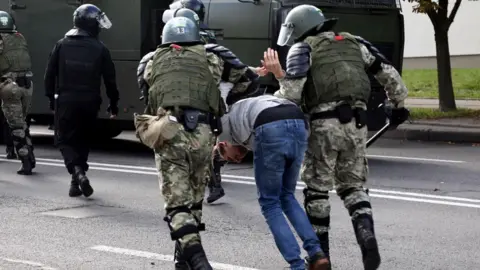 Getty Images
Getty ImagesRyhor Astapenia himself was recently sentenced in absentia to 10 years, along with other academics and analysts, for a supposed plot against the government.
After imprisoning political activists and journalists in Belarus, prosecutors had turned their attention to those who criticise the country abroad.
“They do it because they can,” he shrugs. “They see no reason to stop.”
It was two years after the mass protests of 2020 that the police turned up for Dmitry Luksha. By then, he had imagined he was safe.
“Those two years were my undoing,” he knows now, having spent 28 tough months in jail.
When he was released, unexpectedly, he thought he would stay in Belarus. But that was impossible.
“I would jump whenever the lift opened. Or when a minibus with tinted windows pulled up. And there were so many armed police in the street,” Dmitry explains, from the safety of Warsaw where tens of thousands of other Belarusians now live, for the same reasons.
“You understand that you’ve done nothing wrong, they shouldn’t be coming for you. But you can’t tell your heart that. It’s the brutal Belarus of today, and your heart is afraid.”
That’s why Dmitry hopes the amnesties will continue, whatever is driving the process: Viasna still lists 1,349 political prisoners in Belarus.
“I really hope the numbers released will grow, so that those with long sentences also get out. Those people live in hope that someone will come and tell them: it’s your turn. I really hope they do.”
